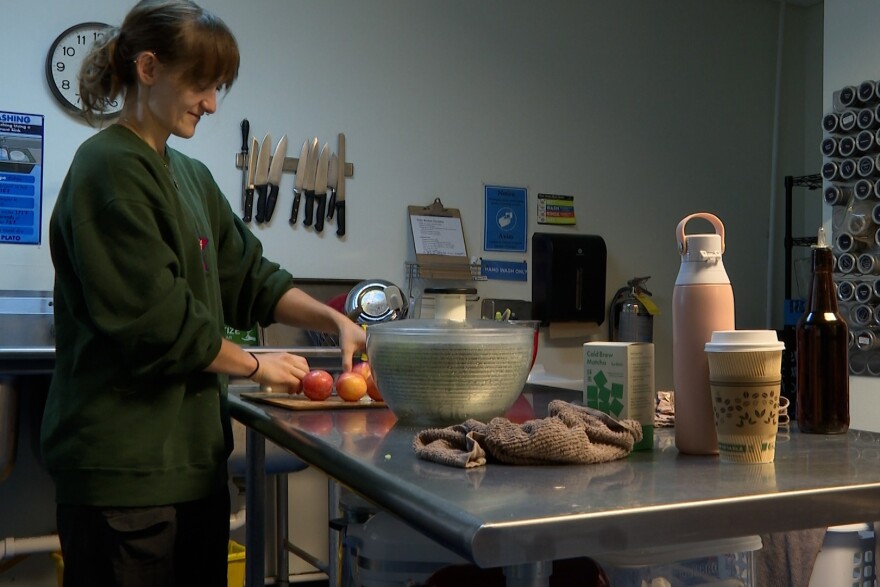Three people sat outside Mother Hubbard’s Cupboard at 10:25 a.m., waiting for it to open. But the food bank doesn’t open until noon on Wednesdays.
Demand at Mother Hubbard’s Cupboard has increased over 20 percent since last year, and President Megan Betz expects that to increase now that the government has been shut down for over a week.
The government shut down Oct. 1 after the Senate failed to pass a Republican-proposed funding bill that made it through the House of Representatives. Lawmakers have continued voting on new funding proposals in the last week, but none have yet garnered the 60 votes needed to pass.
Betz said she receives 20 to 25 percent of the food she distributes from a federal program called The Emergency Food Assistance Program (TEFAP), which helps provide food to low-income people at no cost. The Hoosier Hills Food Bank receives the food and then distributes it to food banks in the area. With the government closed, Betz is relying on orders that were set through November. She cannot make any new orders.
“A lot of what you will see on the shelves is TEFAP food. It's where all of the canned produce that we have right now has come from,” she said. “It's where the bulk of our protein comes from these days, and that has already been something that our patrons have commented on a lot, you know, wanting more, especially animal proteins, and so we're just not sure what that will look like for them.”

The pantry serves between 2,500 and 2,900 individuals a month, Betz said. Last year, it served about 2,100 individuals a month. She attributes the spike in demand to increased food insecurity and cuts to the Supplemental Nutrition Assistance Program (SNAP). Those who qualify for SNAP benefits receive funds on an Electronic Benefit Transfer card. If the government shutdown continues, Betz said there could be a lag or loss of those benefits, and more people could turn to food banks to get food when funds and supplies are already tight.
“If we really aren't able to receive orders past November, there is no backstock in the warehouse to draw from, so people are going to feel that loss pretty quickly,” she said.
One more delivery will likely include meat, Betz said. She is not sure where she will be able to get other food but is working on building partnerships with community stakeholders and considering food drives.
Betz receives Community Development Block Grant funds from the city for administrative and operational expenses, such as paying staff. Betz has to requisition the city for reimbursement; because the government is closed, that process will take longer. The cupboard’s reserve has money to cover three months of expenses, and Betz expects to get donations with end-of-year giving, but it’s still unclear when she’ll get that money back.
“Do we want to continue working in this way that is seemingly increasingly uncertain, where funds are being cut,” she said, “or do we want to really move away from any dollars that are tied to the federal government, and look more exclusively at private and individual contributions? Where do we draw on other resources that will be a little more predictable for us?”
On the northwest side of town at Pantry 279, Assistant Director Traci Ayala said they have steadily been receiving less food through the TEFAP program in the last few months. She used to get six to eight pallets of food a month; now, only a couple of cases a month are delivered. She has also seen a spike in demand; in June, the pantry served under 9,800 people. Now, over 11,000 people rely on the pantry for food.

“Our lines are long, the hours are long. We're not getting enough food,” she said. “The community donations run a lot of our pantry staples, and with the economy in the state that it is right now, it's impossible to give when you don't have anything to give. So, we're seeing a decrease in donations, a decrease in the food from our suppliers, decrease in government funded food and way more clients than we've ever seen before.”
Supplies also are limited, Ayala said. She was supposed to receive over 200,000 pounds of food from July through December through the TEFAP program. With the government shutdown, she won’t get that food.
If the shutdown doesn't end within six months, Ayala said they won’t have the resources to keep their doors open. She is sending out flyers, reaching out to local businesses and applying for grants to find other resources.

“I think where we're at right now, we will be okay for the foreseeable future, not long term,” she said. “If we have to use money that we have set aside for rent and utilities to buy food, then we can't stay in our building. It's a double-edged sword. So, while we have money to cover the bills until Jan. 1, if we have to use that to purchase food that we would have gotten for free through this government program, then it would be sooner than that that we would have to shut down.”
At the Community Kitchen of Monroe County, Assistant Director Tim Clougher said the shutdown hasn’t affected him much so far, but Community Development Block Grant funding and Child and Adult Care Food Program funding may be delayed as long as the government remains shut down.
As a single mom of five children, Ayala said it’s hard to work when everything is uncertain and when there is a lack of job security.
“[It’s] really terrifying, but people have to eat,” she said. “I could find another job, but being here and doing this is the most important thing right now, especially in these hard times. Everyone is struggling, so I'm going to be here doing this, you know, until we can't anymore.”








